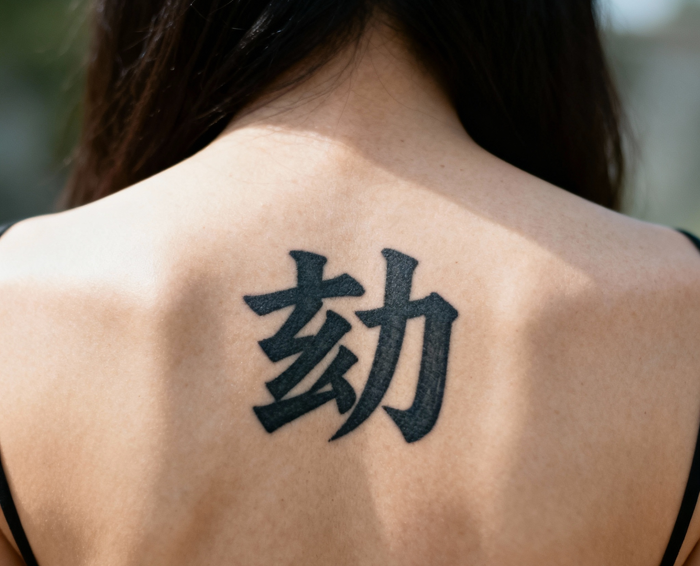
1. Direct Meaning and Breakdown of the Kanji "劾" (Gai)
The kanji 劾 carries a strong, formal, and legalistic meaning.
Core Meaning: To censure, to impeach, to investigate an official's conduct.
Keyword: A formal accusation or investigation into wrongdoing.
Pronunciation:
ガイ (Gai): The on'yomi (Sino-Japanese reading).
Etymological Breakdown:
The character 劾 is composed of two parts:
力 (Chikara): This means "power," "strength," or "force."
亥 (I): This is the twelfth sign of the Chinese zodiac (The Boar). While it serves a phonetic role here, the boar can symbolize fierceness, stubbornness, and direct force.
Combining these, 劾 creates the conceptual image of "using power to root out or confront something," much like a boar digging with its tusks. It implies an official, forceful inquiry.
Common Usage in Japanese:
This kanji is used almost exclusively in formal, legal, and political contexts:
弾劾 (Dangai): Impeachment, censure, accusation. (e.g., 弾劾裁判 - dangai saiban - "impeachment trial").
劾力 (Gairiki): (Rare) Censuring power.
糾弾 (Kyūdan): Denunciation, censure (a similar word, often used in public scandals).
2. "劾" as a Tattoo: Meanings and Severe Warnings
Choosing "劾" as a tattoo is highly controversial, politically charged, and strongly discouraged. Its connotations are almost entirely negative and relate to public accusation and punishment.
Potential (But Highly Problematic) Personal Meanings:
It is extremely difficult to find a positive or empowering personal meaning for this character.
A Symbol of Justice and Holding Power to Account: In an abstract sense, someone might interpret it as a personal commitment to "impeaching" corruption, falsehood, or injustice in the world. It could be seen as a vow to challenge authority and speak truth to power.
Self-Reflection and "Impeaching" One's Own Flaws: A very intellectualized interpretation could be about rigorously investigating and rooting out one's own negative traits or past mistakes. It would represent a harsh, internal court of self-judgment.
Severe Warnings and Potential Consequences:
This is one of the most ill-advised kanji to get as a tattoo. The risks are significant.
Overwhelmingly Negative and Accusatory Connotation: To any Japanese person, this character has one primary meaning: impeachment and formal censure. It is a word of political scandal, legal proceedings, and public shaming. A tattoo of 劾 would be perceived as aggressive, confrontational, and strangely focused on punishment.
Association with Political Turmoil: The word 弾劾 (dangai) is used in the most serious political contexts, such as the impeachment of judges, presidents, or other high officials. Wearing this symbol could inadvertently align you with specific political movements or express a desire for political chaos.
Social Misinterpretation and Hostility: This tattoo could easily be misinterpreted as a threat or a declaration of a vendetta. It projects an energy of accusation and could make others feel uneasy or targeted.
Lack of Poetic or Positive Meaning: Unlike other kanji, 劾 has no hidden positive meaning, philosophical depth, or beautiful symbolism. Its meaning is literal, legal, and negative.
3. Design and Styling Suggestions
There are no recommended design suggestions for this kanji as a tattoo. The only appropriate advice is to strongly recommend against its use in any tattoo context. No calligraphy style can overcome the fundamental problem of its meaning of accusation and censure.
Summary
| Aspect | Explanation |
|---|---|
| Kanji | 劾 |
| Pronunciation | Gai |
| Core Meaning | To impeach, to censure, to officially investigate for wrongdoing. |
| Tattoo Meaning | Effectively, none that are socially acceptable. Any intended personal meaning (e.g., justice) will be completely obscured by the direct association with accusation and political punishment. |
| Suitability | Extremely poor and strongly discouraged. It is unsuitable for virtually everyone. Getting this tattoo would be widely perceived as aggressive, strange, and politically charged, demonstrating a significant lack of cultural and linguistic understanding. |
Final and Unequivocal Advice:
Do not get this tattoo.
If you are seeking a symbol for justice or moral strength, consider these alternatives:
正 (Sei / Tadashii): Correct, just, righteous.
義 (Gi): Righteousness, morality, honor.
法 (Hō): Law, method. (Neutral).
裁 (Sabaki): Judgment, to judge. (More neutral than 劾).
If you are seeking a symbol for self-reflection and overcoming flaws, consider:
省 (Sei / Hansei): To reflect, to examine one's conscience. (e.g., 反省 hansei - "self-reflection").
覚 (Kaku / Satoru): Awakening, enlightenment.
Choosing any of these over 劾 is a respectful and intelligent decision. The kanji 劾 is a symbol of public accusation, not of personal virtue or inner strength.